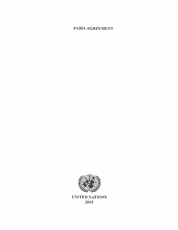Paris Agreement
The Paris Agreement is a landmark climate change treaty requiring countries to take measures intended to prevent global warming from exceeding 1.5 – 2 degrees Celsius (compared to preindustrial levels). States parties are expected to meet nationally determined contributions (NDCs) that reduce their greenhouse gas emissions and become increasingly stringent every 5 years. Developed nations are also required to support climate change adaptation and mitigation efforts in developing countries.
| Opened for signature | 12 Dec 2015 | ||||||
| Entered into force | 4 Nov 2016 | ||||||
| Latest update | 12 Dec 2015 | ||||||
| Available languages |
|
States parties
The Paris Agreement entered into force on 4 November 2016. For states that deposited their instrument of ratification, acceptance or approval after that day, the agreement entered into force on the thirtieth day after their date of deposit.
Per China's declaration, the Agreement applies to Hong Kong and Macao as well. Download the data in this table to view all reservations, understandings, and declarations (RUDs).
Country | Status | Signed | Ratified | Entered into force |
|---|---|---|---|---|
| Afghanistan | Party | 22 Apr 2016 | 15 Feb 2017 | 17 Mar 2017 |
| Albania | Party | 22 Apr 2016 | 21 Sep 2016 | 4 Nov 2016 |
| Algeria | Party | 22 Apr 2016 | 20 Oct 2016 | 19 Nov 2016 |
| Andorra | Party | 22 Apr 2016 | 24 Mar 2017 | 23 Mar 2017 |
| Angola | Party | 22 Apr 2016 | 16 Nov 2020 | 16 Dec 2020 |
| Antigua and Barbuda | Party | 22 Apr 2016 | 21 Sep 2016 | 4 Nov 2016 |
| Argentina | Party | 22 Apr 2016 | 21 Sep 2016 | 4 Nov 2016 |
| Armenia | Party | 20 Sep 2016 | 23 Mar 2017 | 22 Apr 2017 |
| Australia | Party | 22 Apr 2016 | 9 Nov 2016 | 9 Dec 2016 |
| Austria | Party | 22 Apr 2016 | 5 Oct 2016 | 4 Nov 2016 |
Party
The state has accepted, approved, ratified, or is otherwise party to the agreement, indicating consent to be bound to the agreement.
Signatory
The state has signed, but not yet ratified or become an official party to the agreement. Where the signature is subject to ratification, acceptance or approval, the signature does not establish the consent to be bound. However, it is a means of authentication and expresses the willingness of the signatory state to continue the treaty-making process. The signature qualifies the signatory state to proceed to ratification, acceptance or approval. It also creates an obligation to refrain, in good faith, from acts that would defeat the object and the purpose of the agreement.
Non-party
The state has not taken any actions with regard to the agreement.
Associate member
The state may have requirements for some of the statutory or non statutory aspects of an agreement, but would not confer all of the obligations of the agreement on the member. Associate members may not have voting rights.
Observer
The state is non-party to an agreement, but has the ability to attend meetings or other discussions, and otherwise participate in activities. Observers may be granted permission to speak at formal meetings.




